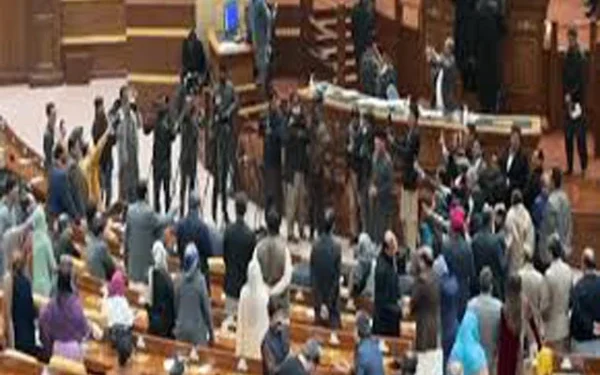Introduction: High-Profile Political Crisis Hits Punjab Assembly
In a major development that has escalated tensions in Punjab’s political landscape, the Speaker of the Punjab Assembly, Malik Ahmed Khan, has filed a disqualification reference against 26 opposition members belonging to the Sunni Ittehad Council (SIC). The move comes in response to what has been described as disruptive and unconstitutional behavior during a recent session of the provincial assembly.
The reference, submitted to the Election Commission of Pakistan (ECP), includes a detailed list of the members’ names, their constituencies, and documented evidence of their alleged misconduct. This action has triggered heated debate across political, legal, and media circles as it raises serious questions about parliamentary decorum, freedom of expression in legislative houses, and the boundaries of political protest.
Background: What Sparked the Controversy?
The reference stems from a turbulent session of the Punjab Assembly held on June 27, 2025, during which opposition members allegedly caused a ruckus, used abusive language, and attempted to disrupt the proceedings while Chief Minister Maryam Nawaz Sharif was delivering her speech. According to eyewitness accounts and assembly footage, members of the Sunni Ittehad Council engaged in loud sloganeering, vandalism, and physical altercations inside the assembly hall.
In response, Speaker Malik Ahmed Khan immediately took notice of the situation and announced the suspension of 26 opposition members on June 28, vowing to file a formal disqualification reference to the ECP. The recent filing of the reference is the culmination of that process.
Legal Grounds: Article 63 and Oath of Office
At the core of the disqualification reference is Article 63 of the Constitution of Pakistan, which outlines the eligibility and disqualification criteria for members of the national and provincial legislatures. Speaker Malik Ahmed Khan, in his official statement, emphasized that the conduct of these members violated their constitutional oath and brought disrepute to the house.
“Upholding the Constitution is the sacred duty of every member of the assembly, which he formally acknowledges while taking the oath. Those who abuse, vandalize, and create chaos do not deserve any concessions,” said the Speaker.
He further argued that violating the oath of office—which includes pledging loyalty to the country and obedience to the Constitution—constitutes a clear breach of constitutional responsibility. The reference asserts that the actions of these 26 members were not merely political protest but amounted to deliberate disruption of legislative business and disrespect of parliamentary norms.
Meeting with Election Commission: Building a Strong Legal Case
Sources confirm that the Speaker met with Chief Election Commissioner Sikandar Sultan Raja and senior officials at the ECP in Islamabad to discuss the legal nuances of the case. During the meeting, the Speaker reportedly shared video evidence, official transcripts of the session, and documents referencing past legal precedents, including a judgment by former Chief Justice Umar Ata Bandial in a similar disqualification case involving former Chief Minister Hamza Shahbaz.
These documents have been appended to the formal reference submitted to the ECP, aimed at bolstering the Speaker’s case and ensuring that the disqualification request is legally sound and procedurally complete.
Speaker’s Media Statement: Strong Words for the Opposition
Speaking to reporters after his meeting with the Election Commission, Speaker Malik Ahmed Khan minced no words in his condemnation of the opposition’s conduct.
“PTI and its allies have turned Form 47 into a political circus. They have crossed all limits of decency and legality. Violation of the Constitution will not be tolerated,” he said.
He emphasized that the sanctity of the assembly must be preserved at all costs, noting that democratic institutions rely on discipline, decorum, and mutual respect among elected representatives. “Misbehavior, abuse, and beating in the house is not democracy, it is hostility to democracy,” he added.
The Speaker also warned that similar actions in the future would lead to even stricter consequences, asserting that parliamentary immunity does not extend to physical misconduct or incitement.
What the Constitution Says: Understanding Article 63
Article 63 of the Constitution is often invoked in cases where lawmakers are accused of misconduct, dual nationality, criminal convictions, or breach of oath. In this instance, the disqualification reference appears to rely primarily on clauses related to conduct unbecoming of a member of the assembly and breach of constitutional loyalty.
Legal experts suggest that while political dissent is permissible, any actions that hinder the functioning of the assembly or disrespect constitutional symbols—such as the office of the Chief Minister—could be interpreted as a violation of the parliamentary code of conduct and oath of allegiance.
Opposition’s Response: Political Victimization or Lawful Action?
As expected, opposition leaders have strongly rejected the disqualification reference, calling it a clear case of political victimization. A spokesperson for the Sunni Ittehad Council stated that the opposition members were simply exercising their right to protest against policies of the newly elected government and that such actions are part of democratic expression.
“We did not damage property or attack anyone. Raising slogans is part of our democratic right. This is nothing but an attempt by the PML-N to silence criticism,” said a senior SIC leader.
However, video footage and multiple eyewitness reports suggest that the opposition’s protest went far beyond slogans. Scuffles were reported, official documents were allegedly torn, and derogatory language was used against the Chief Minister.
Implications: What Happens Next?
Now that the disqualification reference has been formally submitted, the Election Commission of Pakistan will begin reviewing the case. The process typically involves:
- Initial legal examination to verify the validity of the reference.
- Issuance of notices to the 26 members for their formal response.
- Hearings and cross-examination, including review of evidence submitted.
- Final decision by the Election Commission, which may include disqualification, suspension, or dismissal of the case.
If disqualified, the 26 members will not only lose their seats but may also face political bans and restrictions on contesting future elections, under relevant electoral laws.
A Test of Democratic Institutions
This case will be seen as a litmus test for Pakistan’s democratic institutions, including the Punjab Assembly, the Election Commission, and the judiciary. It raises important questions:
- How should parliaments deal with unruly members?
- Where is the line between political protest and constitutional violation?
- Can the legislature function effectively amid such polarization?
Supporters of the Speaker argue that firm action was necessary to preserve the dignity of the assembly. Critics, however, warn that such moves can set dangerous precedents for silencing opposition voices through legal tools.
Conclusion: All Eyes on the ECP’s Verdict
With the political temperature in Punjab rising and the stakes higher than ever, all attention is now on the Election Commission of Pakistan, which must balance legal justice, constitutional principles, and democratic freedoms in its final verdict.
Whether the 26 opposition members are disqualified or cleared, this episode is sure to leave a lasting mark on the political history of Punjab, highlighting the importance of discipline, respect for the constitution, and responsible representation in democratic institutions.

























